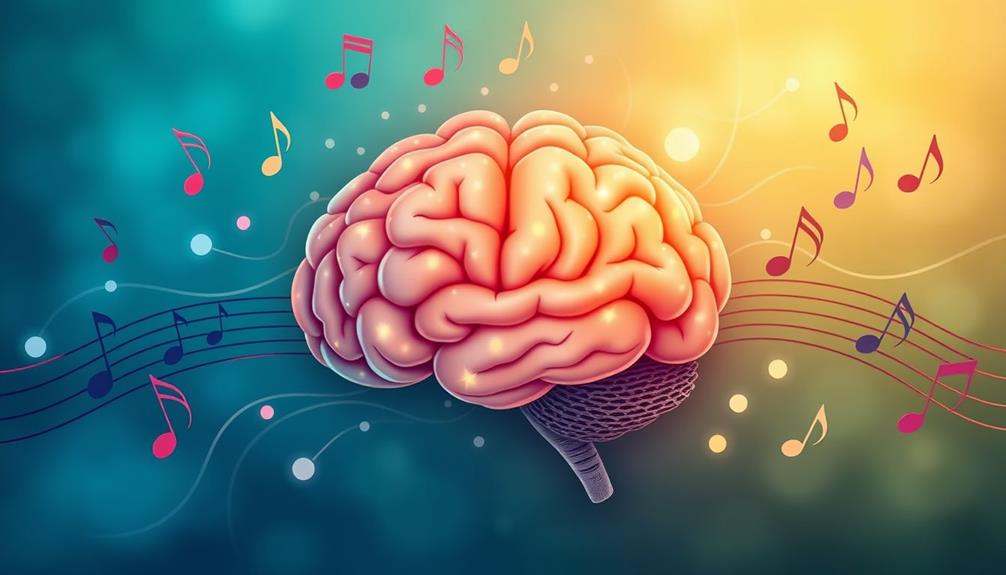Music's a powerful tool for stress reduction that can transform your mood and calm your mind. Listening to soothing melodies lowers cortisol levels, which helps alleviate anxiety and promotes relaxation. Upbeat songs can boost your spirits, while slower tempos help you unwind. Personal preferences matter, so choose music that resonates with you to maximize benefits. You can integrate music into your daily routine, whether during workouts or mindfulness practices, to enhance your overall well-being. Discover how specific genres and curated playlists can further enhance your stress relief journey, opening doors to new ways of finding peace in music.
Key Takeaways
- Music can reduce cortisol levels, lower heart rate, and promote relaxation, effectively alleviating stress and anxiety.
- Upbeat music enhances mood and resilience, while slower tempos facilitate calmness and relaxation.
- Personal preferences play a crucial role; the right music can evoke positive emotions and distract from stressors.
- Engaging with calming genres, such as classical or instrumental music, can enhance focus and mental clarity during stressful situations.
- Incorporating music into daily rituals, like mindfulness practices or workouts, fosters consistent stress relief and improved overall well-being.
Understanding Stress Responses
Stress is a natural response your body has to challenging situations, and it triggers hormonal changes that can lead to increased cortisol levels and a racing heart. When you experience stress, your body's physiological responses prepare you for a fight-or-flight reaction.
However, prolonged exposure to stress can elevate cortisol levels and negatively impact your health, increasing the risk of chronic conditions like cardiovascular disease and depression. Engaging with music, especially through innovative tools like AI-generated compositions, can enhance this stress-relieving experience by offering a diverse range of sounds and tempos that resonate with individual preferences AI in music creation.
One effective way to combat stress is through music. Engaging with music has been shown to promote relaxation by lowering cortisol levels and reducing heart rate. The right music can evoke positive emotions, providing a distraction from ruminative thoughts. Music can also improve focus by creating a calming environment, allowing for increased concentration and mental clarity. For those struggling with stress and anxiety, incorporating music into their daily routine can serve as a useful tool for managing and coping with overwhelming emotions. Whether it’s through classical, ambient, or even modern pop music, individuals have the opportunity to improve focus with music, finding a sense of relief and relaxation in the process.
It can also help synchronize your physiological responses with its rhythm, creating a calming effect. To maximize the benefits, personalized music selection is key. Different genres and tempos resonate differently with individuals; what relaxes one person mightn't work for another.
Music's Impact on Emotions

Music profoundly influences your emotions, shaping how you feel in various situations. Whether you need to unwind after a long day or boost your mood, the right music can make all the difference. Upbeat music, for instance, fosters optimism and positivity, enhancing resilience against stress. Conversely, slower tempos promote relaxation and soothe your muscles, directly impacting your emotional state.
Listening to music at 60 beats per minute aligns your brainwaves with alpha frequencies, inviting calmness. Your personal preferences are pivotal; irritating music can create tension instead of alleviating stress. Emotional responses to music are significant, as your favorite songs often serve as emotional distractions, reducing stress and enhancing well-being.
Here's a quick look at how different types of music impact your emotions:
| Music Type | Emotional Impact | Example |
|---|---|---|
| Upbeat Music | Enhances alertness | Pop or Dance tracks |
| Slower Tempos | Promotes relaxation | Classical or Ambient |
| Personal Favorites | Emotional distraction | Your favorite songs |
Brain Function and Music

Your emotional responses to music aren't just feelings; they trigger real changes in your brain. Listening to music can greatly alter brain functioning, leading to relaxation and stress reduction. Research shows that calming tunes can induce delta brainwaves, which promote sleep, while music with a tempo of 60 beats per minute aligns your brainwaves to alpha frequencies, enhancing relaxation.
In addition, incorporating mindful practices along with music can enhance the overall therapeutic effects, as seen in various approaches to stress management.
Here are four key impacts of music on your brain:
- Cortisol Levels: Music can lower cortisol levels, reducing stress and anxiety.
- Emotional Distraction: Personal favorite songs engage specific brain regions, helping you cope emotionally.
- Physiological Changes: Your brain's response to music leads to notable physiological changes, improving well-being.
- Perceived Control: Self-selected music enhances your sense of control, fostering emotional responses that aid in recovery during stressful times.
Music therapy harnesses these effects, allowing you to experience profound relaxation. As you integrate music into your routine, you'll likely notice improved emotional responses and a calmer state of mind, making it a powerful tool for managing stress and enhancing overall brain functioning.
Effective Music Genres

Several genres of music have proven particularly effective for relaxation and stress reduction. Classical music, especially pieces with a largo movement, promotes calmness and enhances concentration, making it a popular choice.
Incorporating sounds that stimulate the senses, much like how unique mushroom coffee pods enhance health benefits, can also amplify the relaxing effects of your music selection. You might also find that instrumental music works wonders for you, as it allows you to focus on soothing rhythms without the distraction of lyrics.
Genres like Native American, Celtic, and Indian music are particularly effective due to their calming music and natural sounds. These styles offer a unique auditory experience that can greatly reduce stress levels.
Additionally, incorporating nature sounds into your playlists can enhance relaxation, creating an immersive environment that soothes the mind.
However, personal preference plays an important role in the effectiveness of relaxation music. What resonates with one person might irritate another, potentially increasing tension instead of alleviating it.
As a result, it's vital to curate a playlist filled with effective genres that you genuinely enjoy. By focusing on music that brings you peace, you can transform your environment into a calming sanctuary, promoting both relaxation and stress reduction.
Recommended Music Selections

For anyone seeking effective ways to unwind, selecting the right tracks can make all the difference. The right music not only fosters relaxation but also promotes emotional well-being and mental clarity.
Research shows that animals, including cats, can benefit from soothing sounds, as they help create a calming environment for both pets and their owners, enhancing the feline emotional connection.
Here are some recommended selections that provide excellent stress relief:
- A Moment of Peace Meditation: This track features contemporary piano melodies intertwined with nature scenes, creating a soothing atmosphere perfect for relaxation.
- Echoes of Time: Known for its calming effects, this serene Native American flute music enhances meditation practices and aids in stress reduction.
- The Winding Path: Beautiful piano music paired with floral imagery makes this selection ideal for promoting mental clarity and stress relief.
- Weightless by Marconi Union: Specifically designed to lower heart rate and cortisol levels, this track is one of the most effective for stress reduction.
Incorporating these tracks into your routine can help you achieve a sense of calm and healing, making your journey towards relaxation more enjoyable.
Embrace the calming effects of music and let it guide you towards a more tranquil state of mind.
Music Therapy Insights

The power of music extends beyond mere enjoyment; it plays a pivotal role in therapeutic settings as well. Music therapy utilizes structured interventions, like singing and instrument playing, to effectively address emotional and psychological needs. This approach can lead to significant stress reduction and has a positive impact on anxiety levels, particularly for individuals facing mental health conditions.
Incorporating specific poses for back pain into your routine, along with music therapy, can further enhance relaxation and emotional well-being. Research indicates that music therapy can alleviate symptoms of anxiety and depression across diverse patient demographics, with 68.5% of music-based mental health interventions yielding positive results. By engaging in music therapy, you can experience enhancements in relaxation and overall well-being.
This therapy also helps bypass verbal communication barriers, allowing for deeper emotional connections, especially in populations with autism and other mental health challenges.
Furthermore, music therapy has been shown to improve physiological systems related to pain management and sleep quality. You may find that participating in these interventions not only reduces emotional stress but also reinforces your overall life satisfaction.
Fundamentally, music therapy serves as a valuable tool for fostering healing and enhancing your mental well-being.
Practical Integration of Music

To make the most of music in your daily life, start by creating personalized playlists that match your moods and activities.
Incorporating music into various aspects of your routine can enhance productivity, particularly in contexts like music production basics or during relaxation practices.
Identify key moments, like during mindfulness practices or workouts, when you can use music to enhance your experience.
Regularly engaging with music can transform your routine and provide lasting stress relief.
Daily Music Rituals
Incorporating daily music rituals into your routine can transform the way you experience stress. By dedicating just 15 minutes a day to calming playlists, you can greatly reduce cortisol levels and promote relaxation.
Research shows that regular physical activity, complemented by stress management techniques, can greatly enhance emotional stability. Here are four effective ways to integrate music into your daily life:
- Morning Mindfulness: Start your day with a soothing playlist while engaging in mindfulness practices or meditation. This sets a calming tone for the day ahead.
- Cooking with Rhythm: Play your favorite tunes in the kitchen. This not only makes cooking enjoyable but also creates a positive atmosphere that can help reduce stress.
- Exercise Motivation: Incorporate energizing music into your workouts. It enhances your enjoyment and emotional release, making exercise a powerful stress buster.
- Evening Wind Down: Create a relaxing playlist for your evening routine. Listening to calming music can deepen your relaxation and promote better sleep.
These daily music rituals can enhance your emotional well-being and foster a sense of calm throughout the day.
Personalized Playlists Creation
Creating personalized playlists can take your stress reduction efforts to the next level. By curating selections that resonate with your moods and preferences, you enhance your engagement with music and promote relaxation. Using technology and streaming services, you can easily access various genres, maximizing emotional responses and creating a tailored experience.
| Genre | Purpose | Tempo |
|---|---|---|
| Classical | Deep relaxation | Slow |
| Upbeat Pop | Motivation | Fast |
| Ambient | Calm and focus | Moderate |
Experiment with different tempos and styles to see which combinations best support your well-being. For instance, classical music can lower cortisol levels, while upbeat pop tracks may energize you during a workout. Regularly engaging with your personalized playlists helps sustain long-term stress relief, making it easier to adapt your music choices based on specific situations.
Music During Mindfulness Practices
Music serves as a powerful ally during mindfulness practices, enhancing your ability to relax and focus. When you integrate music into your sessions, you'll likely experience several benefits that promote stress reduction. The calming effects of music can create a serene atmosphere, echoing the principles of tranquility found in Cottagecore home office inspiration.
- Heart Rate Reduction: Slow-tempo, calming music can greatly lower your heart rate, making relaxation more effective.
- Enhanced Focus: Guided meditations paired with soothing music help maintain your focus, deepening your overall experience.
- Brain Synchronization: Research shows that music at 60 beats per minute aligns brain activity with alpha waves, fostering a relaxed state ideal for mindfulness.
- Emotional Regulation: Using your preferred instrumental music as a backdrop can improve your emotional regulation and reduce mind-wandering, allowing you to concentrate on the present.
Engaging with music during mindfulness practices not only activates pleasure centers in your brain but also releases dopamine, amplifying feelings of relaxation and well-being.
Incorporating these musical elements into your routine can transform your mindfulness experience, making it a more enriching journey towards inner peace.
Future Research Directions

As you consider the future of music for stress reduction, exploring genre variability could reveal how different styles affect your stress recovery.
Research indicates that curiosity drives lifelong learning and personal development, suggesting that a curious approach to understanding music's effects could enhance therapeutic strategies.
Longitudinal impact studies will also be essential in understanding how music's benefits evolve over time.
Exploring Genre Variability
How do different musical genres influence stress recovery? Understanding genre variability is essential for optimizing music interventions aimed at reducing stress. Research shows that the effects of music on stress recovery can greatly vary based on genre selection, tempo, and individual preference.
Additionally, incorporating elements from aromatherapy techniques could enhance the overall effectiveness of music interventions by promoting relaxation and well-being. Here are some key areas for future exploration:
- Self-Selected Music: Investigate how personal genre preferences enhance perceived control and emotional responses during stress recovery.
- Instrumental vs. Lyrical Music: Analyze whether instrumental music truly promotes better stress recovery compared to potentially distracting lyrical music.
- Physiological Effects: Examine how different genres, such as classical or ambient music, impact physiological markers of stress recovery.
- Psychological Effects: Explore how various genres influence psychological well-being and emotional states during stressful situations.
Understanding these factors can lead to more tailored music interventions that maximize stress recovery.
As studies highlight the heterogeneity in outcomes, recognizing the importance of genre-specific preferences will be key. By focusing on these elements, future research can clarify the differential effects of musical genres and enhance our approach to stress management through music.
Longitudinal Impact Studies
Research into genre variability has laid the groundwork for understanding how different musical styles affect stress recovery, but the long-term implications of music listening require further exploration.
Longitudinal studies can provide valuable insights into the effects of regular music listening on both physiological and psychological resilience to stress. You might consider how various genres influence stress reduction over time, particularly when comparing self-selected versus experimenter-selected music.
Future research should examine changes in cortisol levels and heart rate variability in individuals exposed to chronic stress, evaluating how music interventions can aid in stress management.
It's vital to investigate the cumulative benefits of music therapy in clinical populations, as consistent engagement with music may greatly enhance mental health and well-being.
Moreover, developing standardized measures for gauging music listening interventions will be essential for drawing meaningful conclusions.
By focusing on these areas, you can contribute to a deeper understanding of music's role in fostering resilience and improving stress recovery outcomes.
Ultimately, the insights gained from longitudinal studies could pave the way for more effective music therapy practices and interventions aimed at enhancing psychological resilience and overall health.
Frequently Asked Questions
How Does Music Help Reduce Stress?
When you listen to music, it lowers your heart rate and cortisol levels. The right tempo and genre can synchronize your brain activity, promoting relaxation and helping you manage stress more effectively.
What Is the Best Music to Relieve Stress?
Imagine you're winding down after a hectic day. Light jazz or classical music with a slow tempo can help you relax. Choose what resonates with you, as personal preference is key to finding the best stress relief.
What Are the 5 A's of Stress Management?
The 5 A's of stress management are Awareness, Assessment, Action, Adjustment, and Acceptance. You identify stress triggers, evaluate their effects, take steps to reduce them, adapt your strategies, and learn to accept the unchangeable.
What Are the 4 A's of Stress Management?
You can manage stress by utilizing the 4 A's: Avoid unnecessary stressors, Alter situations or communication, Adapt your perspective to find positives, and Accept what you can't change to foster resilience and cope effectively.
Conclusion
As you weave melodies into the fabric of your daily life, imagine the weight of stress melting away like snow under a warm sun. Let the soothing sounds wrap around you, creating a cocoon of calm amidst chaos. In this symphony of serenity, you'll find not just relief, but a pathway to emotional clarity and resilience. Embrace music as your steadfast companion, guiding you through the stormy seas of stress towards a brighter, more harmonious horizon.










